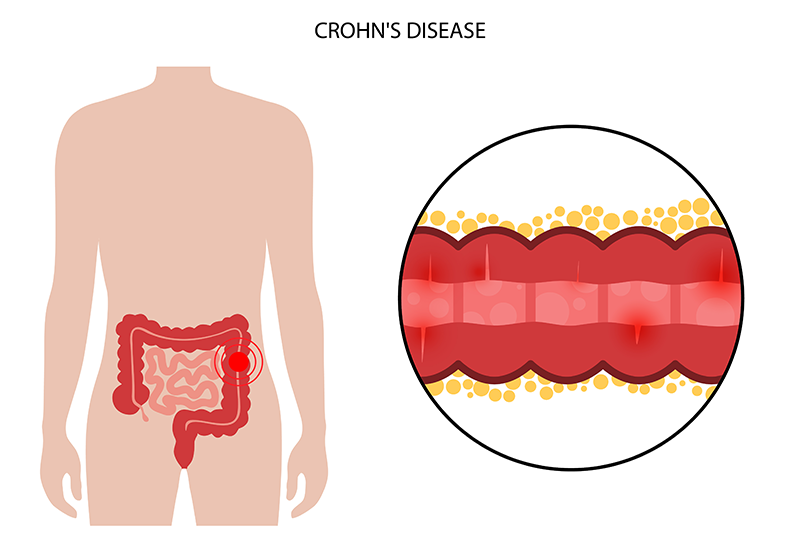Crohn’s disease and ulcerative colitis are chronic inflammatory diseases of the gastrointestinal tract. Crohn’s involves inflammation in lining of digestive tract. From a medical coding service provider’s standpoint, proper documentation by the physician specifying the location of the Crohn’s disease, as well as any complications or manifestations is necessary for proper code selection.
The symptoms of Crohn’s disease depend on the location, the extent, and the severity of the inflammation. The common signs and symptoms of Crohn’s include bloody diarrhea, abdominal pain, fatigue, weight loss, and skin lesions. Crohn’s can present at any age but will more often develop at a younger age. It can also affect people in the 50s and 60s. Other risk factors include genetics, smoking medications, diet, certain bacterial infections, and environmental aspects.
Symptoms can be subtle and mild or severe and obvious. If the inflammation spreads deep into the tissues, it can even result in perforation of the intestine. Though it is a chronic disease, controlling Crohn’s can help people lead a normal life. Early diagnosis and treatment can help prevent serious complications.
Clear and Precise Documentation for Diagnosis Coding
Crohn’s disease is diagnosed using colonoscopy and radiological studies such as barium enema, upper GI series with small bowel follow-through, and CT scans of the abdomen and pelvis. The documentation should clearly indicate the location of the Crohn’s disease, extent of the affected area, severity, and complications.
- Location and extent of affected area
Crohn’s includes the small intestine, large intestine, both small and large intestine, and unspecified. Crohn’s and ulcerative colitis have similar symptoms but there are differences:- While ulcerative colitis is limited to the colon, Crohn’s typically affects the end of the small bowel and the beginning of the colon, but can affect any part of the gastrointestinal (GI) tract.
- In Crohn’s disease, the intestine is a mix of healthy parts and inflamed areas. Ulcerative colitis involves continuous inflammation of the colon.
- Crohn’s disease can occur in all the layers of the bowel wall, while ulcerative colitis affects only the inner most lining of the colon.
To ensure accurate ICD-10 code selection for Crohn’s disease, the documentation should clearly specify the location and extent of the affected area
- Small intestine (duodenum, ileum, jejunum) (regional or terminal)
- Large intestine (colon, large bowel, rectum) (granulomatous colitis or regional colitis), or
- Small and large intestine
The various subtypes of Crohn’s disease and their symptoms are:
Crohn’s enteritis – inflammation confined to the small intestine
Crohn’s colitis – inflammation confined to the colon
Crohn’s entero-colitis and ileo-colitis – inflammation that involves both the small intestine and the colon
Crohn’s terminal ileitis – inflammation that affects only the very end of the small intestine - Severity
In addition to the location of the Crohn’s disease, any complication or manifestation must be clearly documented. Complications of Crohn’s disease may or may not be related to the intestinal inflammation. Intestinal complications of Crohn’s disease include- Rectal bleeding
- Obstruction and perforation of the small intestine or colon
- Fistula
- Abscess
- Other
- Unspecified complications
Rare but potentially life-threatening complications such as extensive distention of the colon and perforation of the intestine may require surgery.
Other complications not related to inflammation of the intestine include:
- Skin lesions on the legs and ankles
- Painful eye conditions
- Arthritis-related joint pain and swelling
- Hepatitis or bile ducts (primary sclerosing cholangitis)
- Nutritional deficiencies
ICD-10 Codes for Crohn’s Disease
Including all these necessary details in the medical record will allow the medical coder to assign the appropriate ICD-10 code (“with complications” or “without complications”).
Without complications
- K50.00, Crohn’s disease of small intestine without complications
- K50.10, Crohn’s disease of large intestine without complications
- K50.80, Crohn’s disease of both small and large intestine without complications
- K51.00, Ulcerative pancolitis without complications
- K51.30, Ulcerative rectosig moiditis without complications
With complications
- K50.011 Crohn’s disease of small intestine with rectal bleeding
- K50.012 Crohn’s disease of small intestine with intestinal obstruction
- K50.013 Crohn’s disease of small intestine with fistula
- K50.014 Crohn’s disease of small intestine with abscess
- K50.018 Crohn’s disease of small intestine with other complication
- K50.019 Crohn’s disease of small intestine unspecified complications
- K50.10 Crohn’s disease of large intestine without complications
- K50.111 Crohn’s disease of large intestine with rectal bleeding
- K50.112 Crohn’s disease of large intestine with intestinal obstruction
- K50.113 Crohn’s disease of large intestine with fistula
- K50.114 Crohn’s disease of large intestine with abscess
- K50.118 Crohn’s disease of large intestine with other complication
- K50.119 Crohn’s disease of large intestine unspecified complications
- K50.80 Crohn’s disease of both small and large intestine without complications
- K50.811 Crohn’s disease of both small and large intestine with rectal bleeding
- K50.812 Crohn’s disease of both small and large intestine with intestinal obstruction
- K50.813 Crohn’s disease of both small and large intestine with fistula
- K50.814 Crohn’s disease of both small and large intestine with abscess
- K50.818 Crohn’s disease of both small and large intestine with other complication
- K50.819 Crohn’s disease of both small and large intestine unspecified complications
- K50.90 Crohn’s disease, unspecified without complication
- K50.911 Crohn’s disease, unspecified with rectal bleeding
- K50.912 Crohn’s disease, unspecified with intestinal obstruction
- K50.913 Crohn’s disease, unspecified with fistula
- K50.914 Crohn’s disease, unspecified with abscess
- K50.918 Crohn’s disease, unspecified with other complication
- K50.919 Crohn’s disease, unspecified with unspecified complications
Coding inflammatory diseases of the gastrointestinal tract are clearly dependent on the physician documentation in the medical record. With diagnosis, management, and treatment clearly documented in the physician’s report, medical coding companies can help gastroenterologists submit error-free claims for optimal reimbursement.




